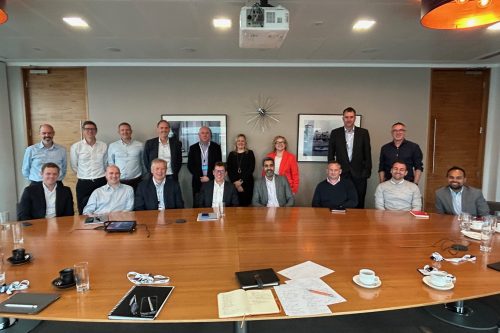Leadership and values at heart of driving growth

The Covid-19 pandemic left a hangover of unprecedented challenges, but out of the difficulties rose opportunities for business growth and resilient leadership.
The region’s Rainmakers came together to discuss the role of the corporate finance community in driving growth at a round table sponsored by the Win Academy.
Business growth and leadership in a post-pandemic world
Managing director of the Win Academy, Martin Coburn, said it “becomes increasingly difficult to manage the complexity of a multi-generational workforce who’ve got quite different needs and different attitudes. Some of the people who’ve been in business a long time, find it quite difficult.
“I think the challenge of leadership is more complex, you’ve got to be a better leader and in professional services, we have to demonstrate fantastic leadership to hang on to talent and make it an interesting place for them to work, whether that’s at home”.
After a torrid couple of years with businesses faced with a myriad of challenges, business leaders need to stop firefighting and get into a growth mindset to create change – but it’s not easy.
Mark Howden, investment director at LDC, says this shift in mindset is challenging, as leaders need to look for the right kind of growth.
He said: “With businesses that have grown very quickly, there may well have been a tendency to just grab opportunities around you. That’s not necessarily going to create value.
“You have to make sure decisions are consistent with the strategy, and have the courage of your convictions to turn down work, which perhaps isn’t the highest quality of earnings, and that’s where it’s really important to focus with management teams to make sure that the growth they’re going after is the right growth for that particular business”.
Resilient management teams and their ability to adapt to changing circumstances

Lee Clifford, Freeths
After a monumental event of the Covid-19 pandemic, Lee Clifford, head of corporate at Freeths, believes it created an environment where disruptive businesses surfaced that were growing quickly.
These have, however, tailed off quickly, which says to Clifford that “fast growth is a caution.
“Having management teams that have longevity, resilience and focus on the core business doesn’t lurch from disrupter-type principles.
“On the other side. Being a disrupter is absolutely fantastic. But it’s the longevity of it, I think is the caution.
“We are in fiscal uncertainty and I think that’s going be an interesting period for us as deal makers because let’s assume the Labour government don’t call the position on capital gains tax in the next budget – I think they went in the one after that. All of the founders out there, there are currently majority owners in businesses will be really thinking about de-risking I think over the next few months be served so we could have a busy time of it”.
After battling incredibly tough trading conditions, it’s easy to see why many business leaders and owners could be burnt out and may lack energy.
However, it creates an opportunity for great businesses to be brought to market which are well set up for growth.
Matt Vincent, senior director of regional business development at ThinCats said: “Good quality management teams over the last 18/24 months are bringing businesses to market in great shape and will be looking to take them through an MBO or whatever the right structure might be.
“We can look at the pandemic as creating a perfect storm for those businesses that planned well and reacted well. There’s still a lot of capital out there – whether that’s from lenders or private equity and trade”.
Whilst the impact of Covid-19 has continued, Helen Brocklebank, regional managing partner at RSM believes, “the best management teams are continually evolving and changing.
“Any business that hasn’t started to evolve or bring that second tier of management team, is actually at risk of falling behind.
“We all go out and see businesses all the time and the successful businesses are continually changing. The transition of a management team is not static, it should be a continual transition.
“The businesses that we see are always thinking, what is that 5-10 year cycle, as there’s going to be five years of upskilling to get closer to that strategic view, and then another five years of transition and handover so it becomes a continuing rolling position”.
David Neate, partner at Evolve Corporate Finance, believes we will see more retirement-driven sales in the market with the threat of capital gain tax changes.
“For smaller owner-managed businesses, succession is always a huge challenge for them.
“They are tired after four years of a pretty horrendous marketplace. With the potential of capital gains tax changes, we could see a bow wave of retirement-driven sales, ultimately impacting the marketplace”.
Younger generations’ values and expectations
For some, the generational gap in motivation has widened, but this can be used to enhance practices.
Liz Jones, corporate banking manager at HSBC said: “Great management teams realise that they haven’t got all the answers. Many people sitting around the table haven’t got all the ideas.
“You need to look amongst your peers that but also your more junior teams, because they come from a different generation and with a different mindset that can be used”.
It’s hard to get the buy-in of the younger generation believes Stuart Sewell, managing director of KPMG, as an “old way of working that if you work really hard and do the right things, you’ll earn decent money and it’ll have a great life” isn’t seen as realistic.
Instead, a focus is placed on enjoyment, rather than earnings potential.
Andrew Cowan, partner at Gateley, says that you “have to give the younger generation more freedom. You’ve got to be prepared to let them take chances and just go with it. If something goes wrong, something goes wrong. It’s not the end of the world.
“In terms of technology, the next generation will do far better. We need to lean towards seeing what they can do with it, rather than being a top-down thing”.
Remote work, culture, and productivity
More junior staff have recently joined Virgin Money, and a great work culture is key says Alpesh Patel, its senior director of acquisition finance.
He said: “We try and support the next cohort coming through and a big difference is there’s a lot less willingness to put up with certain ways of working which were quite common in the past.
“There’s a lot more pushback from younger workers who say no – I’m not going to do that for the money, I will go somewhere else with a better environment and earn less”.
A business Beech Tree Private Equity has been working with has focused for the last year on “not just what their value proposition would be to their customers, but equally as importantly what their employee value proposition was” says Ben Cartwright its director.
“The sector they operate in needs highly-skilled, technical staff who are really sought after. But they know it’s important to attract and create a great culture and environment that people do want to come and work for. They have had very low staff churn and are punching well above their weight in terms of attracting top quality talent”.

Deepak Parekh, Senior Director, Shawbrook
A hangover from the pandemic has been the shift to hybrid and remote working habits, but “where do you draw the line” asked Deepak Parekh, senior director at Shawbrook Bank and Changemaker of the Year 2024.
“There are individuals who want to be in the office, some who prefer to work from home, particularly now that a commute can become quite expensive and time-consuming. But on the flip side, you’ve got senior leadership who are always in because they want to invest in the team and lead by example.
“We have said that our teams need to do what’s right by them. But the question over flexible working is now one of the first few questions a potential applicant will ask. I don’t know what the answer is but I’m all for flexibility”.
“It’s fundamentally about trust, regardless of whatever generation it is,” says Brocklebank.
“You should be able to have a really candid open conversation and as we trust our teams to do great work with our clients, we need to trust that we can have a really open and sensible conversation with them about what works.
“There can be flexibility but also, we want to have that buy-in of the team working together rather than a dictated rule”.
It’s not just about the team for John Campion, partner at DWF.
“In terms of succession and next generation, they’re not going to build their network working at home all the time. It just wouldn’t work.
“It’s an education piece to remind people that they do need to think about the future and where they want to get to and you need to be in the office at least some of the time to do that. You need to come to roundtables like this. You need to be meeting colleagues and other organisations it’s not just about the internal team”.
AI adoption – a tailwind or a headwind
A focus was placed on the role of artificial intelligence (AI) in driving growth and efficiency, with attendees feeling both excitement and concern about its potential impact across various industries.
For Stephen Johnson, investment director at Merica, “AI is both a tailwind and a headwind”.
He said: “A lot of companies in the B2B setting have held off making purchases. Growth has been harder for a lot of software companies but also presents a huge opportunity and potentially unlocks value. It’s scary and encouraging and equal measures”.
Advancements in AI are seen as a “great opportunity in a potentially challenging market to grow the top line” by Beech Tree Private Equity.

Ben Cartwright
Director Ben Cartwright said Beech Tree “encourage people to not get intimidated by AI.
“Starting small can be very effective, so what are the low-hanging fruit that you can use to speed up and take out half an hour of someone’s day, replicating that over hundreds of staff makes a huge difference”.
As the business community awaits the impact of the new government, the challenging path of business growth is still ripe with opportunities.
Leaders were filled with hope for the next year after the pandemic forced management teams to be resilient, adapt and innovate to overcome challenges.
Effective leadership now requires an approach that considers the needs of a multi-generational workforce, embraces the potential of AI, and cultivates a resilient and forward-thinking management team.
By addressing key issues and leveraging the region’s strengths, the West Midlands is set to achieve long-term success.










